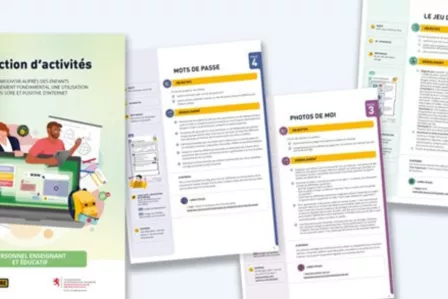This collection of activities aims to encourage primary school children (cycles 2 to 4 in Luxembourg) to use the internet more safely and positively, and is intended for teaching and educational staff. It offers practical exercises (games, crafts) to be carried out quickly and directly. These activities are linked to the skills requirements set out in the “Reference guide for education to and by the media” (Guide de référence pour l’éducation aux et par les médias - Medienkompass).

Who is this publication for?
This activity pack is intended to give teachers and educational staff a tool to develop the digital skills of their pupils, or any child who is entrusted to them in this domain.
It includes activities that are suitable for primary school children, whether at school or during extracurricular activities.
What’s in this collection?
This collection of activities stems from an update and further development of the German guide entitled “Pädagogischer Leitfaden zu Informationssicherheit” (educational guide for online safety), which was published for the first time in 2016 by BEE SECURE.
The collection contains some activities from the previous editions as well as some new activities.
Which approach is used?
The special feature of this publication is that it takes into account the description of all activities linked to the skills requirements set out in the “Reference guide for education to and by the media”, which currently offers a theoretical and practical guidance framework for teaching and educational staff specialising in media training.
All the activities have been tested in practice, and the suggestions made by test participants have been taken into consideration whenever possible. No specific (technical) knowledge or expertise is required to carry out the activities. Overall, the main objective is to support children with their internet use, by constructively addressing online risks and encouraging basic behaviour which is crucial to ensure children’s safety in the digital world.
The collection of activities is available on the BEE SECURE website, in French or German.
Find more information about the work of the Luxembourg Safer Internet Centre, including its awareness raising, helpline, hotline, and youth participation services – or find similar information for other Safer Internet Centres throughout Europe.
This collection of activities aims to encourage primary school children (cycles 2 to 4 in Luxembourg) to use the internet more safely and positively, and is intended for teaching and educational staff. It offers practical exercises (games, crafts) to be carried out quickly and directly. These activities are linked to the skills requirements set out in the “Reference guide for education to and by the media” (Guide de référence pour l’éducation aux et par les médias - Medienkompass).

Who is this publication for?
This activity pack is intended to give teachers and educational staff a tool to develop the digital skills of their pupils, or any child who is entrusted to them in this domain.
It includes activities that are suitable for primary school children, whether at school or during extracurricular activities.
What’s in this collection?
This collection of activities stems from an update and further development of the German guide entitled “Pädagogischer Leitfaden zu Informationssicherheit” (educational guide for online safety), which was published for the first time in 2016 by BEE SECURE.
The collection contains some activities from the previous editions as well as some new activities.
Which approach is used?
The special feature of this publication is that it takes into account the description of all activities linked to the skills requirements set out in the “Reference guide for education to and by the media”, which currently offers a theoretical and practical guidance framework for teaching and educational staff specialising in media training.
All the activities have been tested in practice, and the suggestions made by test participants have been taken into consideration whenever possible. No specific (technical) knowledge or expertise is required to carry out the activities. Overall, the main objective is to support children with their internet use, by constructively addressing online risks and encouraging basic behaviour which is crucial to ensure children’s safety in the digital world.
The collection of activities is available on the BEE SECURE website, in French or German.
Find more information about the work of the Luxembourg Safer Internet Centre, including its awareness raising, helpline, hotline, and youth participation services – or find similar information for other Safer Internet Centres throughout Europe.
- Safer Internet Centre (SIC) media literacy child-friendly resource campaign
Related content
- < Previous article
- Next article >












